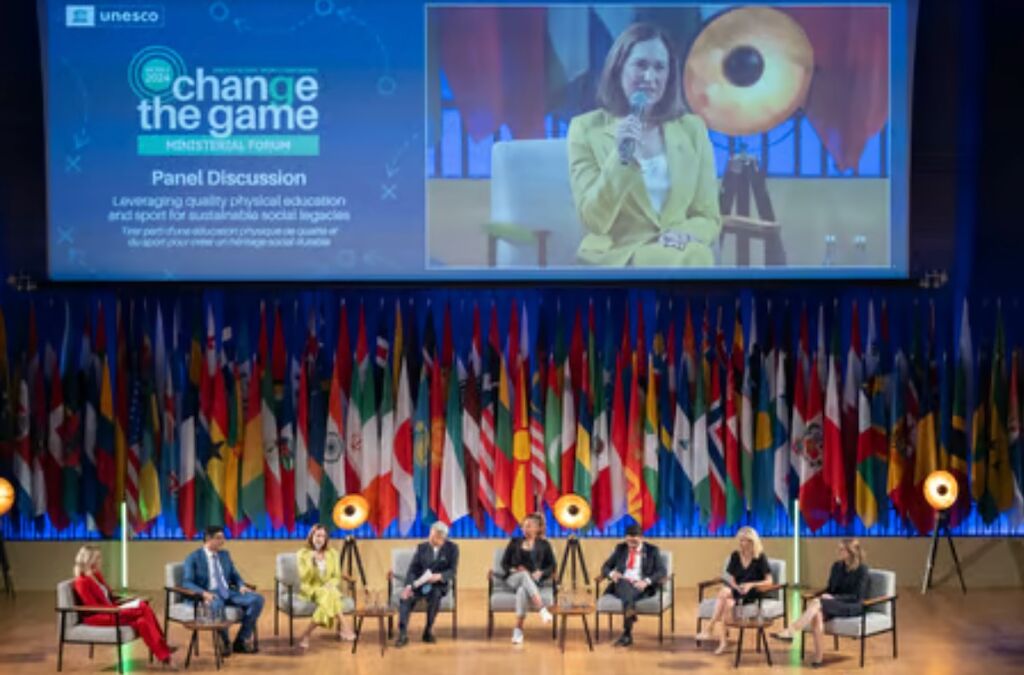The most significant sport policy event was the ‘Change the Game’ Sport conference, hosted by UNESCO in Paris on 23-24 July. I had the privilege of attending on behalf of the UNESCO Chair at Loughborough University, and in wider support of the UK Delegation to UNESCO.
Global Policy in Sport and Physical Education: Supporting UNESCO’s Commitment to ‘Change the Game’
Over the summer of 2024, the world’s attention was undoubtedly on the sport action at the Paris Olympics. But for those of us in global sport policy and diplomacy, the focus was also on key events surrounding the Games.
The conference examined how sport and physical education (PE) can contribute to global sustainable development; and, how UNESCO’s inspiring work in this area can be supported. Over 800 delegates attended, including ministers, government officials, sport organisations, the private sector, leading athletes, NGO officials, and other stakeholders from across the world.
The importance of global sport and PE policy
Why are UNESCO and its partners putting this global policy emphasis on sport and PE? Three reasons might be highlighted.
First, UNESCO view sport and PE as human rights in themselves. As Article 1 of the International Charter states, ‘The practice of physical education, physical activity and sport is a fundamental right for all.’
Second, sport, PE and other physical activities are increasingly used worldwide to promote young people’s personal and social development, such as in life skills, health education, social inclusion, and employability. UNESCO have taken on a central policy role in this global ‘sport for development’ sector.
Third, as the conference underlined, sport and PE represent ‘smart investments’ for government. They deliver positive social outcomes, such as better health or education outcomes. They also produce big financial returns: every US$1 invested in sport programmes can generate returns of US$3-$124, such as in reduced health and other welfare spending.
Yet much work remains to be done. For example, a recent landmark global report on PE, co-authored by UNESCO and Loughborough University, found that PE remains chronically underfunded, most PE teachers in primary schools lack specialist training, and 1 in 3 students with disabilities have no access to PE.
For UNESCO, the global policy solution is provided by Fit for Life, the organisation’s flagship ten-year worldwide initiative, launched in 2022, which seeks to boost global participation, policymaking, and investment in sport and PE.
UNESCO appreciate fully that financing Fit for Life – inspiring governments and other stakeholders to make ‘smart investments’ in sport and PE – is a major challenge. Hence, UNESCO are promoting an innovative programme funding model, known variously as ‘Outcomes-Based Funding’ or ‘Social Outcome Contracts’. The model involves sport programmes being initially financed by investors, such as a social investment fund; investors are only repaid (with interest), usually by government, if programmes meet their outcome targets (such as improved employment or training outcomes for participants). Appealingly, the model ensures outcomes are central to programme planning, governments only pay for successful programmes, and risks of failure are borne by investors.
The contribution of the United Kingdom
The UK will continue to make vital contributions to support UNESCO and Fit for Life in this broad global policy space. We hold a key position as a Vice-Chair on UNESCO’s ‘CIGEPS’ committee which drives sport and PE policy. We are a global leader in using ‘Social Outcome Contracts’ successfully in sport programmes, notably through DCMS, the GO Lab at Oxford University, and the NGO Substance. We have huge expertise in many relevant policy areas such as quality physical education, social inclusion in sport, safeguarding, and sport for development programming. And we are home to many leading stakeholders in global sport and PE: government departments, sport clubs and federations, businesses, NGOs, universities and other R&D organisations.
As the Paris conference demonstrated, these are vital and exciting times in global sport and PE. I would like to take this opportunity to call on UK policy stakeholders to support Fit for Life, and to enable the UK to be at the heart of UNESCO’s work in this global field.








